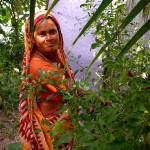This 2x2 week programme aims to train professionals in both Southern and Northern countries in the field of natural disaster prevention, especially related to climate change. This course proposes an integrated and interdisciplinary approach and focuses on populations at risk, reduction of vulnerabilities and the strengthening of capabilities. The course is based on the North-South >> Read more
Publication: (World Bank) Economic Opportunities for Women in the East Asia and Pacific Region
Economic Opportunities for Women in the East Asia and Pacific Region By Amanda Ellis, Daniel Kirkwood, and Dhruv Malhotra This book brings together data and available evidence on the constraints that female entrepreneurs in the East Asia and the Pacific Region region face with regard to: access to assets, business regulations and governance issues, and >> Read more
News: Food or Cash? New IFPRI study assesses the effectiveness of transfer programs
What makes a more effective social safety net program: transfers of food, or cash? The question is hardly academic. Governments, international agencies, and non-governmental organizations must decide whether to provide the world’s poorest people with cash, food, or a mixture of the two. In recent years, many have begun favoring cash transfers over food aid. >> Read more
News: Women Spreading Political Wings With Help of India’s Quota System
By MIAN RIDGE NY TIMES TENT, INDIA — As sarpanch, or chief, of this northern Indian village, Maya Yadav has fought hard for local women over the past five years. She has encouraged more parents to send their daughters to school and fewer to shell out fat dowries when their girls marry. But her proudest >> Read more
News: PHILIPPINES Women’s College Corrects Gender Miseducation
MANILA, Apr 16 (IPS) - Flip open a typical textbook used in many Philippine schools and you will likely find images of women illustrating verbs such as ‘cook’ or ‘clean’, but hardly appearing anywhere much in economics and history textbooks. These are examples of the gender miseducation that textbooks in this South-east Asian country often >> Read more
Publication (book): Food, diversity, vulnerability and social change Research findings from insular Southeast Asia
By: Anke Niehof (Wageningen University) Book Series: Food, diversity, vulnerability and social change 2010, 144 pages, paperback, Mansholt Series - ISSN 1871-9309, Volume 9 Food is a universal basic need. The diverse ways in which people and households try to meet this need, the constraints they are up against in doing so, and the strategies >> Read more
Resources: The Asian Development Bank’s Support to Gender and Development Phase I Evaluation Report Relevance, Responsiveness, and Results to Date
This special evaluation study assesses implementation effectiveness of ADB’s 1998 Policy on Gender and Development (GAD) through an analysis of its relevance, responsiveness, and results to date. The evaluation is designed to be conducted in two phases. Phase I, covered in this report, is based mainly on a desk review of about 500 related documents, >> Read more
Multimedia: Videos from Global Conference on Ag. Research for Development
[vimeo http://vimeo.com/10479539] Mary Mtoola is an urban farmer, living and working in Kibera, the second largest slum area in Africa. [vimeo http://vimeo.com/10479725] Mosammat Morzina Begum and her husband Mohammad Afsar Ali are rural farmers in the district of Bogra, Bangladesh. For more videos
Publications: Comparing Food and Cash Transfers to the Ultra-Poor in Bangladesh
Bangladesh has some social safety net programs that transfer food to the poor, some that transfer cash, and some that provide a combination of both. This study evaluates the relative impacts of food and cash transfers on food security and livelihood outcomes among the ultra poor in Bangladesh and includes an extensive analysis of gender-impacts >> Read more
CPRC Brief: ‘Curbing dowry practices: an anti-poverty imperative’
Peter Davis Kathryn Bach Abstract It has been recognised that dowry in South Asia hinders women’s empowerment and can serve as a cause of violence against women. A recent study in Bangladesh highlights that dowries also have serious economic repercussions, with families identifying dowry payment as a leading cause of impoverishment. This policy brief also >> Read more

